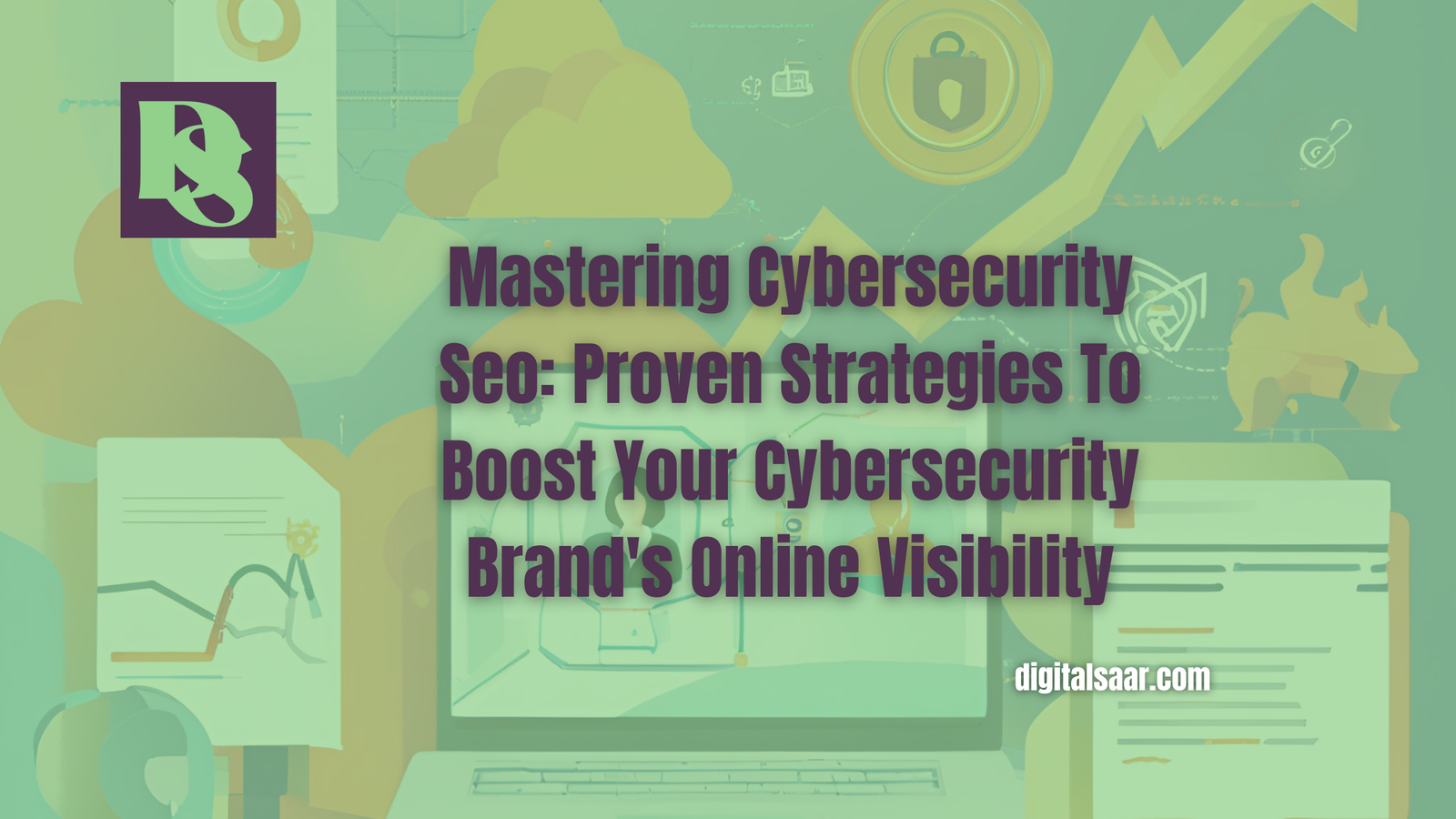In today’s digital world, cybersecurity SEO is becoming increasingly important as businesses and individuals seek to protect their online information. Cybersecurity is all about keeping our digital lives safe from threats like hackers and malware. As more people realize how crucial it is to have strong security measures in place, the demand for cybersecurity services grows.
Now, let’s talk about SEO, or Search Engine Optimization. SEO is a way to make sure that when people search online for information related to cybersecurity, they can easily find your website. For cybersecurity brands, good SEO means showing up at the top of search results, which can attract more visitors and help build trust.
In this article, we’ll explore how to use cybersecurity SEO to improve your online presence. We’ll cover simple strategies to boost your website’s visibility and help you connect with those who need cybersecurity solutions. Whether you’re new to SEO or looking to refine your approach, this guide will provide you with practical tips to make your cybersecurity brand stand out online.
What Is Cybersecurity SEO?
Cybersecurity SEO is all about making sure that people looking for information on internet safety can find your website easily. Imagine you’re a superhero who protects people from online dangers like hackers and viruses. Just like how superheroes need to be noticed to help others, your website needs to be seen by people who are searching for cybersecurity help.
So, what does this mean for your website? It means you need to use special tricks to help search engines, like Google, understand what your website is all about. This way, when someone types in keywords like “cybersecurity tips” or “online safety,” your website shows up at the top of their search results. This helps you connect with more people who need your cybersecurity expertise and services.
Differences Between General SEO And Cybersecurity SEO
When we talk about general SEO and cybersecurity SEO, we’re discussing two types of strategies to help websites show up in search results. Here’s a simple way to understand the differences:
General SEO:
- Focuses on a wide range of topics: This type of SEO can apply to any kind of website, whether it’s about cooking, travel, or technology.
- Uses common keywords: Keywords might be general, like “best pizza recipe” or “holiday destinations.”
- Targets a broad audience: It’s all about getting noticed by as many people as possible who are searching for a variety of topics.
Cybersecurity SEO:
- Focuses specifically on online safety: This type of SEO is all about topics related to protecting against online threats, like hackers and malware.
- Uses specialized keywords: Keywords are specific to cybersecurity, such as “how to prevent cyber attacks” or “best antivirus software.”
- Targets people interested in cybersecurity: It aims to reach those who are searching for information or services to keep their digital life secure.
In short, while general SEO is about a wide range of topics, cybersecurity SEO zooms in on everything related to online safety. This helps cybersecurity brands get noticed by people who need their special expertise.

Importance Of Targeted SEO Strategies For Cybersecurity Firms
For cybersecurity firms, using targeted SEO strategies is crucial to stand out in a crowded online space. Here’s why it’s so important:
- Reaching the Right Audience: By focusing on specific keywords related to cybersecurity, such as “network security” or “data breach prevention,” you can attract people who are actively looking for solutions to their online security problems. This means your website will be seen by those who truly need your expertise.
- Building Credibility: When your site ranks high for cybersecurity-related searches, it shows that you’re an authority in the field. This can build trust with potential clients who are looking for reliable and knowledgeable cybersecurity providers.
- Staying Ahead of Competitors: The cybersecurity field is competitive, with many companies vying for attention. Targeted SEO helps you stand out from the crowd and be more visible than other firms. This can give you an edge in attracting new clients. Additionally, combining SEO with PPC (Pay-Per-Click) advertising can further boost your visibility. Tools like PPC Intelligence can provide valuable insights into competitor ads and keyword performance, helping you refine both your SEO and PPC strategies to stay ahead.
- Improving User Experience: Targeted SEO involves creating content that answers specific questions and addresses particular needs. This means your visitors will find relevant and helpful information quickly, making their experience on your site better.
- Driving Quality Traffic: Rather than attracting random visitors, targeted SEO brings in people who are genuinely interested in cybersecurity services. This can lead to higher conversion rates, meaning more visitors will become paying clients.
In essence, targeted SEO strategies help cybersecurity firms connect with the right people, build their reputation, and stay ahead in a competitive market.
Strategies Used For Cybersecurity Seo
When aiming to boost your cybersecurity website’s visibility and attract potential clients, a comprehensive SEO strategy is essential. Here’s a deeper dive into the key strategies:
1. Keyword Research
- Identifying Relevant Keywords: Start by researching keywords that potential clients might use when searching for cybersecurity services. Use tools like Google Keyword Planner, Ahrefs, or SEMrush to find terms related to cybersecurity threats, solutions, and technologies.
- Long-Tail Keywords: Focus on long-tail keywords such as “best firewall for small businesses” or “how to prevent phishing attacks.” These are less competitive and often attract users with specific needs.
- Competitor Analysis: Look at the keywords your competitors are targeting. Tools like Moz or SpyFu can help you understand which keywords are driving traffic to their sites.
2. On-Page Optimization
- Meta Tags:
- Title Tags: Craft engaging and keyword-rich title tags that accurately reflect the content of each page. For example, “Top Cybersecurity Solutions for Small Businesses.”
- Meta Descriptions: Write compelling meta descriptions that include your target keywords and encourage users to click through from search results.
- Headers:
- Header Tags: Use header tags (H1, H2, H3) to structure your content and incorporate keywords naturally. For instance, an H1 tag might be “Comprehensive Cybersecurity Solutions,” with H2 tags breaking down specific services.
- Content:
- Quality Content: Develop content that is informative, well-researched, and relevant to cybersecurity. Address common problems, offer solutions, and provide actionable tips.
- Keyword Placement: Include keywords in strategic locations such as the first paragraph, headers, and throughout the content, but avoid keyword stuffing.
- Multimedia: Use images, infographics, and videos to make your content more engaging. Ensure these are optimized with descriptive filenames and alt text.
3. Technical SEO
- Website Speed:
- Optimization: Compress images, leverage browser caching, and use a content delivery network (CDN) to enhance loading speeds.
- Tools: Use tools like Google PageSpeed Insights or GTmetrix to analyze and improve your site’s speed.
- Mobile-Friendliness:
- Responsive Design: Ensure your site adapts to different screen sizes and devices. Test your site’s mobile performance using Google’s Mobile-Friendly Test.
- Secure Site:
- HTTPS: Implement HTTPS to secure data transfer between your site and users. This is a ranking factor and crucial for building trust.
4. Content Marketing
- Blog Posts:
- Regular Updates: Publish regular blog posts on topics such as cybersecurity best practices, emerging threats, and industry news. This keeps your audience engaged and improves your site’s authority.
- How-To Guides: Create step-by-step guides or tutorials to help users understand and implement cybersecurity measures.
- Whitepapers and Case Studies:
- In-Depth Content: Produce whitepapers and case studies that showcase your expertise and provide detailed analysis of cybersecurity challenges and solutions.
- Lead Generation: Use these resources to capture leads by offering them in exchange for contact information.
5. Link Building
- Guest Blogging:
- Outreach: Reach out to reputable cybersecurity blogs and websites to contribute guest posts. This helps you earn valuable backlinks and exposes your brand to a wider audience.
- Industry Partnerships:
- Collaboration: Partner with other cybersecurity firms or industry influencers for joint content projects or events. Exchange backlinks and share each other’s content to build authority.
6. Local SEO
- Google My Business:
- Profile Optimization: Create and optimize a Google My Business profile with accurate business information, including your address, phone number, and website.
- Local Keywords: Incorporate location-based keywords into your site’s content and meta tags to attract local traffic.
- Local Listings: Ensure your business is listed in local directories and review sites to increase visibility.
7. Monitoring and Analytics
- Performance Tracking:
- Tools: Use Google Analytics and Google Search Console to monitor your site’s performance, including traffic sources, user behavior, and keyword rankings.
- Metrics: Track key metrics such as organic traffic, bounce rates, and conversion rates to gauge the effectiveness of your SEO strategies.
- Adjustments:
- Data-Driven Decisions: Regularly review your performance data and make adjustments to your strategies based on what’s working and what’s not. This may involve refining keywords, improving content, or optimizing technical aspects.
Conclusion
Effective cybersecurity SEO involves a combination of keyword research, on-page and technical optimization, content marketing, and strategic link building. Each element plays a crucial role in enhancing your site’s visibility and credibility. Additionally, integrating PPC advertising and leveraging tools like PPC Intelligence can provide a competitive edge by driving targeted traffic and offering insights into optimizing both your SEO and ad campaigns.
Remember, SEO is not a one-time effort but an ongoing process. Regularly monitor your performance, adapt to changes in search algorithms, and keep up with the latest industry trends to maintain and improve your search rankings.
By focusing on these strategies, you can position your cybersecurity firm as a trusted authority, attract high-quality leads, and achieve long-term success in the digital landscape.
If you found this guide helpful, please share it with your network! Like and comment below to let us know your thoughts or ask any questions. We’d love to hear from you!
FAQs
Why is SEO important for cybersecurity companies?
SEO helps cybersecurity companies reach decision-makers, build trust, and generate qualified leads by increasing visibility in search engine results for relevant, high-intent keywords.
What are the most effective SEO strategies for cybersecurity brands?
Key strategies include targeting industry-specific keywords, creating expert-level content on threats and solutions, building high-authority backlinks, optimizing for E-E-A-T (Experience, Expertise, Authoritativeness, Trust), and leveraging technical SEO.
How do you choose the right keywords in the cybersecurity niche?
Focus on a mix of commercial and informational intent keywords, such as “ransomware protection for businesses” or “SIEM vs XDR.” Use keyword research tools and analyze competitor content to uncover gaps and opportunities.
Can technical topics like cybersecurity rank well on Google?
Yes—if the content is well-structured, digestible, and written by or attributed to experts. Using real-world use cases, updated threat insights, and clear explanations can boost rankings and user engagement.
How long does it take to see SEO results for a cybersecurity website?
Typically, it takes 3–6 months to see significant SEO improvements, depending on competition, domain authority, content quality, and backlink profile. Consistent effort and monitoring are key.





